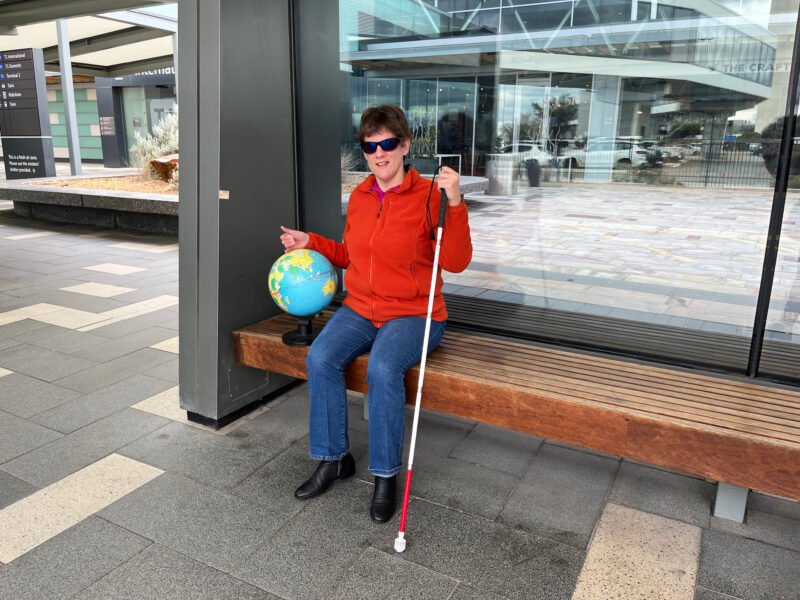We’re out of the pandemic, travel restrictions have lifted and summer is approaching – all signs that it’s time for a getaway! But there can be challenges travelling as a someone living with vision impairment.
It doesn’t have to be daunting. If you plan your trip there’s a world of sensory experiences you can explore.
If you have low or no vision and are travelling independently, why not take on board some tips offered by our Assistive Technology Officer Nicki Muir, based in Bunbury. Nikki was born prematurely and grew up blind. Before she jets off to her next destination, we found time to ask her a few questions about travelling with a vision impairment.

What’s your main priorities when travelling abroad?
I always opt for the meet and assist service when travelling at airports. It makes travel easier as people will assist you and guide you at check-in and help with connecting flights or help you get your luggage at baggage claim. Many vision impaired travellers pass through airports each and every day. Airports are becoming far more accessible.
The key to a good holiday is to plan in advance. Always book accommodation beforehand or consider staying with friends. Big cities are often designed in a grid layout, so they are easier to navigate. Remote villages are less accessible.
What destinations would you recommend if you’re travelling with vision impairment?
Travelling as a vision impaired person, you need to consider the infrastructure of the country you’re visiting, the transportation and support it offers for people with low or no vision. Personally, I prefer the UK and most of Europe, specifically France, Germany and Holland. In addition, high on my list would be the United States of America and Canada.
These developed countries embrace accessibility. Public transport is easy to access with physical and tactile indicators at the edge of road surfaces and platforms. Braille signage is more common in Europe and the USA.
Entertainment in developed countries is more inclusive. Museums offer tactile tours and theatres stage audio-described performances. Furthermore, I find people living in these countries respect people with disabilities and are more likely to offer assistance. In Europe, most people have a basic or good command of the English language – a big plus!
Where would you never go?
I would never go to a place like Bali. Yes, it’s close to Perth and cheap, but the roads are congested and there are no proper footpaths. For someone blind, it’s hazardous to find your way around. From a cultural point of view, I feel there’s less respect for people with a disability, so I feel more vulnerable.
What is your greatest bugbear while travelling?
There are definitely policies at airports that frustrate me. Travelling as a someone with vision impairment, I get irritated with airport staff who want to put me in a wheelchair rather than lead me. It takes 30 seconds for me to teach someone how to do a sighted guide. It’s far quicker than getting me to sit in a wheelchair and then being pushed around!
What are your three top tips?
- Take some AirTags (link opens in new window). AirTags are a great invention and have only been around a year or so. They are small circular tracking tags and work alongside Apple devices in the Find My app. I put an AirTag tracking device in each piece of luggage to know where it is!
- I always pack a spare mobility aid, a white cane whenever I travel. You can easily misplace one when you’re having fun and not concentrating.
- Do not be afraid to ask for help. It’s absolutely essential when travelling overseas.

Do you have any bad anecdotes from past holidays where something unfortunate happened?
Yes, I left my cane in the back of a taxi while travelling in the United States. As soon as I realised, I called the taxi company, but they couldn’t find it. Fortunately, I could borrow one while I ordered another cane from Canada. Now, even when I travel short distances, I always have a spare one hidden in the bottom of my suitcase.
Where are you holidaying next?
I am heading back to the United Kingdom and France. I want to take the train under the English Channel, visit London Buckingham Palace and hear Big Ben chime. Also on my radar is France – I would love to go and see the Louis Braille museum.
How to get support
Are you interested in receiving therapy and support from VisAbility? Please complete the form below to make an initial enquiry about the low vision services we can provide. Our Client Experience Team will contact you to discuss your individual needs both now and into the future.
